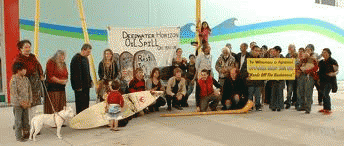This is my second article on community activism here in New Plymouth
New Plymouth is sometimes referred to as the Texas of New Zealand, owing to its (tiny) off-shore gas fields and oil rigs. It's also home to a highly vocal oil/gas industry watchdog group called Climate Justice Tarananki. It was this group that first raised the alarm on local fracking operations in March 2011. Taranaki is also the first region in New Zealand to protest fracking (http://www.stuff.co.nz/southland-times/news/5439145/Fracking-debate-heating-up-in-NZ).
The gas industry has engaged in low level hydraulic fracturing -- aka "fracking" -- in Taranaki and other parts of New Zealand for many years. It has been stepped up recently owing to impending depletion of Taranaki's off-shore gas fields. Local Maori from Parihaka marae strongly oppose fracking and oil company plans for deep water oil exploration. Both violate rights they are guaranteed under the Treaty of Waitangi, and a formal complaint has been laid with the United Nations, as well as Taranaki Regional Council and the New Zealand government (http://www.scoop.co.nz/stories/PO1108/S00191/letter-of-position-from-parihaka.htm).
Parihaka is world famous as the birthplace of non-violent resistance (to Maori land seizures by the English in 1878). Based on Ghandi's writings, it's believed our local Maori inspired him to incorporate non-violent civil disobedience as a political tactic.
Another Regulatory Agency that Doesn't Regulate
Taranaki Regional Council is the local government agency that is supposedly responsible for environmental protection in this part of New Zealand. I say supposedly because they seem to be more pro-industry than pro-environment when it comes to fracking. Not only did they allow TAG Oil to engage in fracking without notifying the public, but they have failed to act on serious compliance infractions that have major public health implications.
As a result of protest action by Climate Justice Taranaki, TRC has formally agreed not to allow fracking without a publicly "notified" consent process -- in which local residents can make submissions opposing fracking. However as you can see from this Taranaki Daily News editorial http://www.stuff.co.nz/taranaki-daily-news/opinion/5332967/Editorial-A-fracking-scandal-on-our-back-doorstep, they continue to maintain that fracking is totally safe and poses no risk to human health.
The editorial quotes evidence from TRC's own compliance reports, obtained (by Green MP Catherine Delahunty) under the Open Information Act, suggesting TAG Oil has already violated the conditions of their consent. Among the non-compliance notifications and warnings the Daily News cites are
- Drill waste being re-injected within six metres of a waterway.
- Substandard holding pond construction, resulting in a stream being contaminated via an underground spring.
- Soil samples containing barium levels double the acceptable standard for human health
- An unexplained increase of chloride, nitrate, and barium in Taranaki groundwater.
The OIA release also lists the highly toxic chemicals TAG Oil injects into the our rockbed include Xcide 102 (a biocide toxic to humans, domestic animals, fish and wildlife); Inflo-150 (a friction reducer containing highly toxic methanol and ethylene glycol); and GBW-41L (aka hydrogen peroxide -- an animal carcinogen harmful to humans in vapor form, even at low concentrations).
Here again, the TRC claim that these chemicals are safe when diluted is meaningless. Even the EPA admits that these chemicals -- which have never been vigorously tested -- have the potential to have serious health impacts in minute concentrations.
Good Local Media Coverage
Unlike the US media, New Zealand newspapers still provide good coverage of local public health issues -- at least in the provinces. The Daily News editorial notes that fracking was banned by France in May this year, while a moratorium is currently in place in South Africa, Quebec, New South Wales, New York State, New Jersey, and Pennsylvania. In some cases this halt has occurred because of serious accidents and/or unexplained occurrence of freak earthquakes.
Another major victory for Greenpeace and Climate Justice Taranaki was a recent decision by Anadarko Petroleum (in response to a groundswell of public opposition and protest) to defer their deep sea oil exploration until 2012. Anadarko owned 25% of the blown-out oil well that caused the Gulf Oil Spill disaster in 2010.






